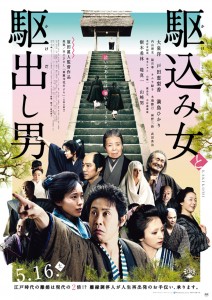“Kakekomi” – Film Review from the 19th Japanese Film Festival (Australia and New Zealand)
Eden Law (Fukushima-ken ALT 2010-2011) reviews “Kakekomi”, a historical comedy drama set in 19th century Japan, about kakekomi, women who seek divorce from abusive husbands by fleeing to a temple sanctuary. And yes, I did say comedy, along with the drama.

Sisters are doing it for themselves
A light, historical comedy-drama set in mid-19th century Japan, kakekomi refers to the sole method by which women in feudal Japan could legally divorce their husbands, by seeking refuge in a temple for a period of time, after which the marriage would be declared null and void by law. In this time period, Edo (now modern-day Tokyo) groans under the severe austerity and moral reforms imposed by a puritanical government that seeks to outlaw all corrupting pleasures and foreign influences, such as Christianity, western medicine, entertainment (both traditional and foreign) and ironically, sushi. Even the use of colour in print is considered subversive, as a character complains about the unexciting and plain novels available for sale.
Two women, meeting by chance on a dark night on a lonely road, journey to Tokei-ji in order to become kakekomi – Jogo (Toda Erika), who seeks to escape from an abusive marriage, and O-Gin (Mitsushima Hikari), a beautiful and refined concubine whose reasons for leaving are not clear. They are assessed by the administrators of a local inn for their suitability, aided by the wise Genbei (Kiki Kirin). Also seeking refuge at the inn, is Genbei’s nephew Nakamura Shinjiro (Oizumi Yo), an idealistic and eccentric student of medicine with ambitions to be a writer. Over two years, the temple, its inhabitants and the local inn have to contend with various issues and problems, including dissatisfied husbands seeking the return of their wives.
An adaptation of the novel Tokeiji Hanadayori by Hisashi Inoue, Kakekomi moves at a brisk pace, juggling several story lines with a large cast of characters. Considering a rather confusing first part, where subplot introductions and dialogue whizz past at dizzying speed (testing one’s ability to speed-read the subtitles), the film surprisingly manages to tie all the strands together fairly well, although there is a bit of deus ex used in the resolution of some of these. Incredibly, director Harada Masato made a four-hour version before merciless editing it down to about 2.5 hours, which helps explain the sometimes disjointed and out-of-place feel of certain scenes, with some secondary characters being little more than a slightly caricaturised plot device. This doesn’t mean however that Kakekomi is unenjoyable – thanks in large part to the great cast. Oizumi’s rubbery-faced Shinjiro, is a highly endearing goofball, who deftly manages to balance comedy and seriousness. Toda, as Jogo, is fantastic to watch as her character grows in confidence and strength throughout the film. Special mention goes to Hizuki Hana who plays the Tokeiji’s Abbess, a living embodiment of the phrase “an iron fist in a velvet glove” – managing to be hilarious and terrifying at the same time.
Apart from bursting at the edges with plots, the film is also crammed with both the visual and aural delights. The cinematography is gorgeous, filmed on location in an actual centuries-old temple complex, and the passing of the seasons and time is impossibly picturesque – and that opening shot of raindrops falling onto a carpet of moss, creating tiny pits over time, is just poetry. Those with a love of period costume will drool over the historically accurate costumes and sets, faithfully reproduced. The characters also sing a lot of songs – the film is not a musical by any means, but it gives a rich depiction of culture that the conservative government is trying to suppress as being decadent. Kakekomi might not really have an agenda other than a desire to entertain, but there is a strong message about censorship and resistance to change, and most of all, about the benefits of empowerment, especially of its female characters, who are just as strong and capable as – sometimes even more than – the men. Kakekomi is definitely engaging and well worth watching, and I would love to check out the full-length director’s cut if it ever comes out on DVD (at least then I can hit the pause button to read the subtitles in full).


Comments are closed.